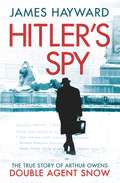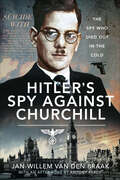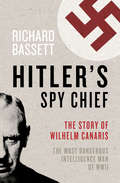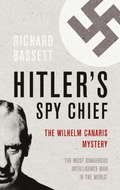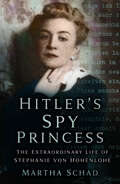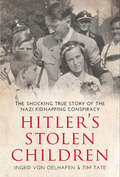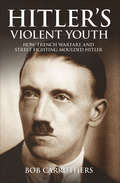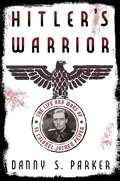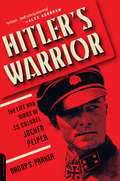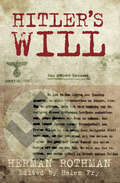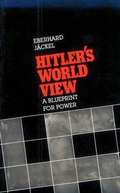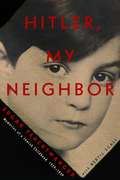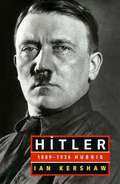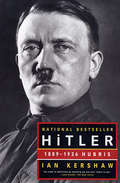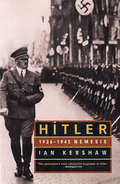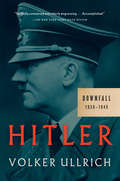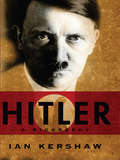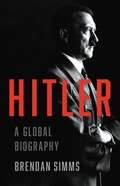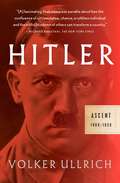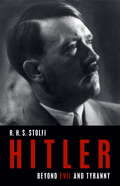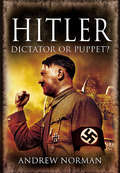- Table View
- List View
Hitler's Spy
by James HaywardOriginally published as Double Agent Snow, Hitler's Spy is the paperback edition, which tells of how on the eve of the outbreak of the Second World War the double-agent Arthur Owens, codenamed SNOW, is summoned to Berlin and appointed Hitler's chief spy in Britain. Days later he finds himself in Wandsworth prison, betrayed by the wife he traded for a younger model, and forced to transmit false wireless messages for MI5 to earn his freedom - and avoid the hangman's noose. A vain and devious anti-hero with no moral compass, Owen's motives were status, money and women. He mixed fact with fiction constantly, and at times insisted that he was a true patriot, undertaking hazardous secret missions for his mother country; at other times, Owens saw himself as a daring rogue agent, outwitting British Intelligence and loyal only to the Fatherland. Yet in 1944, as Allied troops stormed the beaches of Normandy on D-Day, Hitler was caught unawares, tricked into expecting the invasion across the Pas de Calais in a strategic deception played out by Owens and the double-cross agents of MI5. For all his flaws, Agent Snow became the traitor who saved his country. Based on recently de-classified MI5 files and previously unpublished sources, Hitler's Spy is the story of a secret Battle of Britain, fought by Snow and his opposing spymasters, Thomas 'Tar' Robertson of MI5 and Nikolaus Ritter of the Abwehr, as well as the tragic love triangle between Owens, his wife Irene, and his mistress Lily Funnell. The evocative, fast-paced narrative moves from seedy south London pubs to North Sea trawlers, from chic Baltic spa resorts to Dartmoor gaol, populated by a colourful rogue's gallery of double-cross agents.
Hitler's Spy Against Churchill: The Spy Who Died Out in the Cold
by Jan-Willem van den BraakFrom the summer of 1940 until May 1941, nearly twenty German Abwehr agents were dropped by boat or parachute into England during what was known as Operation Lena, all in preparation for Hitler's planned invasion of England. The invasion itself would never happen and in fact, after the war, one of the Abwehr commanders declared that the operation was doomed to failure. There is no doubt that the operation did indeed become a fiasco, with almost all of the officers being arrested within a very brief period of time. Some of the men were executed, while others became double agents and spied for Britain against Germany. Only one man managed to stay at large for five months before eventually committing suicide: Jan Willem Ter Braak. Amazingly, his background and objectives had always remained unclear, and none of the other Lena spies had ever even heard of him. Even after the opening of the secret service files in England and the Netherlands over 50 years later, Jan Willem Ter Braak remained a 'mystery man', as the military historian Ladislas Farago famously described him. In this book, the author – his near-namesake – examines the short and tragic life of Jan Willem Ter Braak for the first time. Using in-depth research, he investigates the possibility that Ter Braak was sent to kill the British Prime Minister Winston Churchill and discovers why his fate has remained largely unknown for so long.
Hitler's Spy Chief: The Wilhelm Canaris Mystery
by Richard BassettA remarkable tale of espionage and intrigue--the true story of Wilhelm Canaris, Hitler's intelligence chief, and his role in the conspiracy to assassinate the Führer Admiral Wilhelm Canaris was appointed by Hitler to head the Abwehr (the German secret service) eighteen months after the Nazis came to power. But Canaris turned against the Fu¨hrer and the Nazi regime, believing that Hitler would start a war Germany could not win. In 1938 he was involved in an attempted coup, undermined by British Prime Minister Neville Chamberlain. In 1940 he sabotaged the German plan to invade England, and fed General Franco vital information that helped him keep Spain out of the war. For years he played a dangerous double game, desperately trying to keep one step ahead of the Gestapo. The SS chief, Heinrich Himmler, became suspicious of Canaris and by 1944, when Abwehr personnel were involved in the attempted assassination of Hitler, he had the evidence to arrest Canaris himself. Canaris was executed a few weeks before the end of the war. In a riveting true story of intrigue and espionage, Richard Bassett reveals how Admiral Canaris's secret work against the German leadership changed the course of World War II.
Hitler's Spy Chief: The Wilhelm Canaris Mystery
by Richard BassettHow Hitler's spy chief sabotaged the German war effort.Wilhelm Canaris was appointed by Hitler to head the Abwehr (the German secret service) 18 months after the Nazis came to power. But Canaris turned against the Fuhrer and the Nazi regime, believing that Hitler would start a war Germany could not win. In 1938 he was involved in an attempted coup, undermined by British Prime Minister Neville Chamberlain. In 1940 he sabotaged the German plan to invade England, and fed General Franco vital information that helped him keep Spain out of the war. For years he played a dangerous double game, desperately trying to keep one step ahead of the Gestapo. The SS chief, Heinrich Himmler, became suspicious of the Abwehr and by 1944, when Abwehr personnel were involved in the attempted assassination of Hitler, he had the evidence to arrest Canaris himself. Canaris was executed a few weeks before the end of the war.
Hitler's Spy Chief: The Wilhelm Canaris Mystery
by Richard BassettHow Hitler's spy chief sabotaged the German war effort.Wilhelm Canaris was appointed by Hitler to head the Abwehr (the German secret service) 18 months after the Nazis came to power. But Canaris turned against the Fuhrer and the Nazi regime, believing that Hitler would start a war Germany could not win. In 1938 he was involved in an attempted coup, undermined by British Prime Minister Neville Chamberlain. In 1940 he sabotaged the German plan to invade England, and fed General Franco vital information that helped him keep Spain out of the war. For years he played a dangerous double game, desperately trying to keep one step ahead of the Gestapo. The SS chief, Heinrich Himmler, became suspicious of the Abwehr and by 1944, when Abwehr personnel were involved in the attempted assassination of Hitler, he had the evidence to arrest Canaris himself. Canaris was executed a few weeks before the end of the war.
Hitler's Spy Princess: The Extraordinary Life of Stephanie von Hohenlohe
by Martha Schad‘Hold on to this letter, so that it will be evidence of how accurately I have kept you informed. I’m serious; don’t throw this letter away.’BORN the illegitimate daughter of Jewish parents, Princess Stephanie von Hohenlohe would rise to dizzying heights in international politics, hobnobbing with European royalty, British aristocracy – and high-ranking Nazis. She was the unofficial go-between for some of the most important people of the era, conveying secret messages and organising meetings between Adolf Hitler, Lord Rothermere, the Duke and Duchess of Windsor and more than one US president. She would even be one of only a handful of women to be awarded the Nazi Party’s Gold Medal for ‘outstanding service to the National Socialist movement’.But then the Second World War began, and everything changed.Hitler’s Spy Princess is a tale of lovers and manipulation, cleverness and deceit in the remarkable life of the woman Hitler called his ‘dear princess’.
Hitler's Stolen Children: The Shocking True Story of the Nazi Kidnapping Conspiracy
by Tim Tate Ingrid von OelhafenHitler’s Stolen Children is a powerful, first-person account of being at the heart of one of the Nazi’s cruelest and most obscene experiments—the Lebensborn program to create a new Aryan master race. In 1942, when she was nine months old, Erika Matko was stolen from her family in St. Sauerbrunn in what was then Yugoslavia and transported to Germany to be “Germanized.” She was chosen because, unlike her older brother and sister, she was blond and blue eyed, and had passed a medical racial examination that classed her as Aryan. Lebensborn then farmed her out to politically vetted German foster parents. Renamed Ingrid von Oelhafen, she grew up believing she was German. Then, one day, friends of her foster family revealed the truth about her origins. This was the beginning of a life-long quest to discover the truth about her birth and the Lebensborn program. It was a journey that would take her across Germany, uncovering the terrible secrets of Lebensborn—including the kidnapping of up to half a million babies like her and the deliberate murder of those deemed “sub-standard”—and back to the village where she was born. But here she would be faced with something even more painful: a woman who for more than seventy years had been using her name—and living her life.
Hitler's Violent Youth: How Trench Warfare and Street Fighting Moulded Hitler
by Bob CarruthersAn Emmy Award–winning author and historian delves into the brutal early life of the man who would become Nazi Germany&’s maniacal dictator. Between 1889 and 1924, Adolph Hitler&’s political outlook was borne out of vicious incidents that heralded the formation of the Sturmabteilung—the notorious SA. Drawing extensively on Hitler&’s own biographical account in Mein Kampf, Bob Carruthers illustrates how these events influenced the future führer&’s worldview and led directly to the Beer Hall Putsch of 1923. Hitler&’s difficult relationship with his cruel father, his harsh experiences in Vienna, and his involvement in the Great War all conditioned him to celebrate violent acts. By Hitler&’s own account, his complete disregard for the consequences of his actions was vindicated by his victories in fierce encounters including beer hall brawls and street battles. Each successive triumph over adversity influenced his decision-making process, imbuing him with a love of violence and culminating in the ill-fated events of November 1924, which saw Hitler imprisoned for the second time. Carruthers also explores the parallel growth of the SA from a small group of fist fighters to a feared paramilitary force along with a comprehensive survey of the violent events between 1920 and 1924, which shaped this infamous political instrument of terror alongside the man who instigated World War II.
Hitler's Warrior
by Danny S. ParkerFrom a leading expert, a definitive biography of the fearsome and controversial German SS tank commander of "Hitler’s Own” Panzer Division
Hitler's Warrior
by Danny S. ParkerFrom a leading expert, a definitive biography of the fearsome and controversial German SS tank commander of "Hitler’s Own” Panzer Division
Hitler's Warrior: The Life and Wars of SS Colonel Jochen Peiper
by Danny S. ParkerFrom a leading expert, a definitive biography of the fearsome and controversial German SS tank commander of "Hitler's Own" Panzer Division
Hitler's Warrior: The Life and Wars of SS Colonel Jochen Peiper
by Danny S. ParkerFrom a leading expert, a definitive biography of the fearsome and controversial German SS tank commander of "Hitler’s Own” Panzer Division
Hitler's Will
by Helen Fry Herman RothmanHerman Rothman arrived in Britain from Germany as a Jewish refugee in 1939, on the eve of the Second World War. He volunteered for HM Forces, serving in the Intelligence Corps, and in 1945 was posted to Westertimke and Fallingbostel prisoner of war camps to interrogate high-ranking Nazi war criminals. When papers were discovered sewn into the shoulders of a jacket belonging to Heinz Lorenz, who had been Joseph Goebbels' press secretary, he and a team of four others were charged with translating them under conditions of the deepest secrecy. The documents turned out to be the originals of Hitler's personal and political wills, and Goebbels' addendum. Later, in Rotenburg hospital, Rothman interrogated Hermann Karnau, who had been a police guard in Hitler's bunker, to establish informaiton about the Fuhrer's death. 'Hitler's Will' is the amazing true story of Herman Rothman's remarkable life, including how he managed to escape from Nazi Germany before the War began, and his role in bringing to light Hitler's personal and political testaments.
Hitler's World View: A Blueprint for Power
by Eberhard Jäckel Herbert ArnoldEven the demonic Hitler had a comprehensive philosophy, and Jäckel probes deeply into the dictator's mind to determine how he viewed the world.
Hitler, My Neighbor: Memories of a Jewish Childhood, 1929-1939
by Adriana Hunter Edgar Feuchtwanger Bertil ScaliAn eminent historian recounts the Nazi rise to power from his unique perspective as a young Jewish boy in Munich, living with Adolf Hitler as his neighbor. Edgar Feuchtwanger came from a prominent German-Jewish family--the only son of a respected editor and the nephew of a best-selling author, Lion Feuchtwanger. He was a carefree five-year-old, pampered by his parents and his nanny, when Adolf Hitler, the leader of the Nazi Party, moved into the building opposite theirs in Munich. In 1933 the joy of this untroubled life was shattered. Hitler had been named Chancellor. Edgar's parents, stripped of their rights as citizens, tried to protect him from increasingly degrading realities. In class, his teacher had him draw swastikas, and his schoolmates joined the Hitler Youth. Watching events unfold from his window, Edgar bore witness to the Night of the Long Knives, the Anschluss, and Kristallnacht. Jews were arrested; his father was imprisoned at Dachau. In 1939 Edgar was sent on his own to England, where he would make a new life, a career, have a family, and strive to forget the nightmare of his past--a past that came rushing back when he decided, at the age of eighty-eight, to tell the story of his buried childhood and his infamous neighbor.
Hitler: 1889-1936 Hubris
by Ian KershawThis is a biography of Hitler from birth to 1936, and his creation of The Third Reich, i.e., Nazi Germany.
Hitler: 1889-1936 Hubris
by Ian KershawHailed as the most compelling biography of the German dictator yet written, Ian Kershaw's Hitler brings us closer than ever before to the heart of its subject's immense darkness. From his illegitimate birth in a small Austrian village to his fiery death in a bunker under the Reich chancellery in Berlin, Adolf Hitler left a murky trail, strewn with contradictory tales and overgrown with self-created myths. One truth prevails: the sheer scale of the evils that he unleashed on the world has made him a demonic figure without equal in this century. Ian Kershaw's Hitler brings us closer than ever before to the character of the bizarre misfit in his thirty-year ascent from a Viennese shelter for the indigent to uncontested rule over the German nation that had tried and rejected democracy in the crippling aftermath of World War I. With extraordinary vividness, Kershaw recreates the settings that made Hitler's rise possible: the virulent anti-Semitism of prewar Vienna, the crucible of a war with immense casualties, the toxic nationalism that gripped Bavaria in the 1920s, the undermining of the Weimar Republic by extremists of the Right and the Left, the hysteria that accompanied Hitler's seizure of power in 1933 and then mounted in brutal attacks by his storm troopers on Jews and others condemned as enemies of the Aryan race. In an account drawing on many previously untapped sources, Hitler metamorphoses from an obscure fantasist, a "drummer" sounding an insistent beat of hatred in Munich beer halls, to the instigator of an infamous failed putsch and, ultimately, to the leadership of a ragtag alliance of right-wing parties fused into a movement that enthralled the German people. This volume, the first of two, ends with the promulgation of the infamous Nuremberg laws that pushed German Jews to the outer fringes of society, and with the march of the German army into the Rhineland, Hitler's initial move toward the abyss of war.
Hitler: 1936-1945 Nemesis
by Ian KershawThe climax and conclusion of one of the best-selling biographies of our time. The New Yorker declared the first volume of Ian Kershaw's two-volume masterpiece "as close to definitive as anything we are likely to see," and that promise is fulfilled in this stunning second volume. As Nemesis opens, Adolf Hitler has achieved absolute power within Germany and triumphed in his first challenge to the European powers. Idolized by large segments of the population and firmly supported by the Nazi regime, Hitler is poised to subjugate Europe. Nine years later, his vaunted war machine destroyed, Allied forces sweeping across Germany, Hitler will end his life with a pistol shot to his head. "[M]ore probing, more judicious, more authoritative in its rich detail...more commanding in its mastery of the horrific narrative."--Milton J. Rosenberg, Chicago Tribune
Hitler: 1939-1945 (Hitler Biographies Ser. #2)
by Volker UllrichFrom the author of Hitler: Ascent, 1889-1939--a riveting account of the dictator's final years, when he got the war he wanted but his leadership led to catastrophe for his nation, the world, and himself. In the summer of 1939 Hitler was at the zenith of his power. The Nazis had consolidated political control in Germany and a series of foreign-policy coups had restored Germany to the status of a major world power. He now embarked on realizing his lifelong ambition: to provide the German people with the resources they needed to flourish and to exterminate those who stood in the way. Yet despite a series of stunning initial triumphs, Hitler's decision to invade the Soviet Union in 1941 turned the tide for good.Now, Volker Ullrich offers fascinating new insight into Hitler's character and personality, vividly portraying the insecurity, obsession with minutiae, and narcissistic penchant for gambling that led Hitler to overrule his subordinates and then blame them for his failures; and, ultimately, when he realized the war was not winnable, to embark on the annihilation of Germany itself in order to punish the people who he believed had failed to hand him victory. This is a masterful account of a spectacular downfall, and an essential addition to our understanding of Hitler and the Second World War.
Hitler: A Biography (Atalaya Ser. #Vol. 55)
by Ian Kershaw"Magisterial . . . anyone who wishes to understand the Third Reich must read Kershaw."--Niall Ferguson "The Hitler biography of the twenty-first century" (Richard J. Evans), Ian Kershaw's Hitler is a one-volume masterpiece that will become the standard work. From Hitler's origins as a failed artist in fin-de-siecle Vienna to the terrifying last days in his Berlin bunker, Kershaw's richly illustrated biography is a mesmerizing portrait of how Hitler attained, exercised, and retained power. Drawing on previously untapped sources, such as Goebbels's diaries, Kershaw addresses the crucial questions about the unique nature of Nazi radicalism, about the Holocaust, and about the poisoned European world that allowed Hitler to operate so effectively. Some images in the ebook are not displayed owing to permissions issues.
Hitler: A Global Biography
by Brendan SimmsFrom a prize-winning historian, the definitive biography of Adolph HitlerHitler offers a deeply learned and radically revisionist biography, arguing that the dictator's main strategic enemy, from the start of his political career in the 1920s, was not communism or the Soviet Union, but capitalism and the United States. Whereas most historians have argued that Hitler underestimated the American threat, Simms shows that Hitler embarked on a preemptive war with the United States precisely because he considered it such a potent adversary. The war against the Jews was driven both by his anxiety about combatting the supposed forces of international plutocracy and by a broader desire to maintain the domestic cohesion he thought necessary for survival on the international scene.A powerfully argued and utterly definitive account of a murderous tyrant we thought we understood, Hitler is essential reading for anyone seeking to understand the origins and outcomes of the Second World War.
Hitler: A Portrait of a Tyrant
by Albert MarrinA biography of the struggling Austrian artist who rose from obscurity to power as the leader of the Nazi party and, later, the German nation, and whose ambitions led the world to war.
Hitler: Ascent, 1889-1939
by Volker UllrichA New York Times 2016 Notable BookA major new biography—an extraordinary, penetrating study of the man who has become the personification of evil.“Ullrich reveals Hitler to have been an eminently practical politician—and frighteningly so. Timely… One of the best works on Hitler and the origins of the Third Reich to appear in recent years.” —Kirkus Reviews“An outstanding study… All the huge, and terrible moments of the early Nazi era are dissected…but the real strength of this book is in disentangling the personal story of man and monster.” —The Guardian (U.K.) For all the literature about Adolf Hitler there have been just four seminal biographies; this is the fifth, a landmark work that sheds important new light on Hitler himself. Drawing on previously unseen papers and a wealth of recent scholarly research, Volker Ullrich reveals the man behind the public persona, from Hitler's childhood to his failures as a young man in Vienna to his experiences during the First World War to his rise as a far-right party leader. Ullrich deftly captures Hitler's intelligence, instinctive grasp of politics, and gift for oratory as well as his megalomania, deep insecurity, and repulsive worldview. Many previous biographies have focused on the larger social conditions that explain the rise of the Third Reich. Ullrich gives us a comprehensive portrait of a postwar Germany humiliated by defeat, wracked by political crisis, and starved by an economic depression, but his real gift is to show vividly how Hitler used his ruthlessness and political talent to shape the Nazi party and lead it to power. For decades the world has tried to grasp how Hitler was possible. By focusing on the man at the center of it all, on how he experienced his world, formed his political beliefs, and wielded power, this riveting biography brings us closer than ever to the answer.Translated from the German by Jefferson Chase.
Hitler: Beyond Evil and Tyranny (German Studies)
by R. H. StolfiCountless books, including five major biographies, have been devoted to the subject of Adolf Hitler. Yet, despite the mass of tantalizing detail uncovered over six decades, the man at the center of so much historical, psychological, and political analysis remains elusive. For some, he was evil personified, a diabolical tyrant driven by a lust for power; for others, he was a banal demagogue, an opportunist with a talent for propaganda and oration but little more than an empty vessel embodying the disappointments of a defeated Germany. Though we know many facts about Hitler, no coherent picture of his character or personality emerges. Instead, we are left with a cardboard cutout of an evil dictator whose life, in the end, no one can really explain. This fascinating and richly detailed new biography of Hitler reinterprets the known facts about the Nazi Fuehrer to construct a convincing, realistic portrait of the man. In place of the hollow shell others have made into an icon of evil, the author sees a complex, nuanced personality. Without in any way glorifying its subject, this unique revision of the historical Hitler brings us closer to understanding a pivotal personality of the twentieth century.
Hitler: Dictator or Puppet?
by Andrew NormanWritten by an authority on Adolf Hitler, this book charts new ground and shows how the writings of a deluded ex-monk, Lanz von Liebenfels and the pseudo-science of Liebenfels and other writers, convinced Hitler that Germanys destiny was to save the world from a Jewish-Bolshevik conspiracy. It was this perverted sense of destiny that drove the Nazi Party and led to the outbreak of WWII and the deaths of some sixty million people as well as the destruction of much of Europe. Using the writings of Liebenfels from his magazine Ostara, Dr Andrew Norman demonstrates how the mass murders of Jews, Gypsies, mentally-ill people and those regarded as less than human had its roots in articles written by Liebenfels. An index of Ostara articles is included and their very titles indicate the malign influences that shaped Hitlers Germany.
